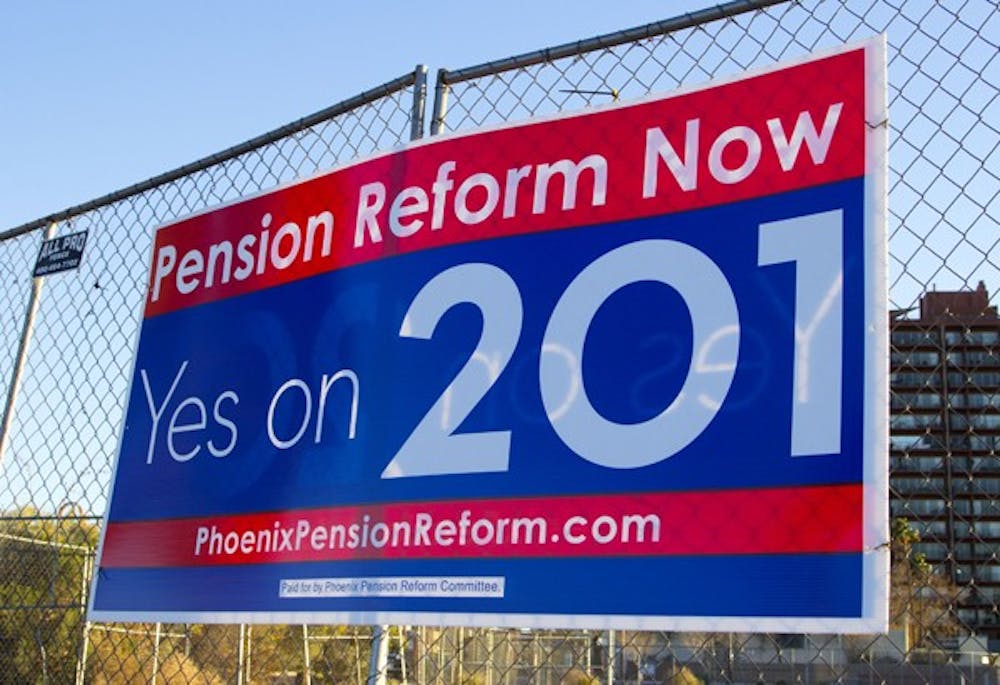 Proposition 201, which proponents claim would save taxpayers $596 million over the next 23 years, changes contributions into public employee pensions. (Photo by Ana Ramirez)
Proposition 201, which proponents claim would save taxpayers $596 million over the next 23 years, changes contributions into public employee pensions. (Photo by Ana Ramirez)A proposed Phoenix proposition would address a city pension program that is headed towards insolvency. Proposition 201, which proponents claim would save taxpayers $596 million over the next 23 years, redoes contributions into public employee pensions.
City employees contribute 5 percent of their pensions to the city of Phoenix Employee Retirement System while city taxpayers cover the rest of the fees. Mayor Greg Stanton put together a task force to recommend responsible pension reform to find a more sustainable system, resulting in Proposition 201.
Rick Degraw, chairman of the city of Phoenix Pension Reform Task Force, said many of the goals set out in the proposition mirror pension programs used in other Arizona cities and the pension program that operates on the state level.
“It will put the Phoenix retirement system on good, healthy footing,” he said.
Proposition 201 would split the cost of pension 50/50 between taxpayers and city employees who will receive the pension funds. It would also add three years to the amount of time an employee must work to receive pension funds.
The changes would only apply to employees hired after July 2013. Arizona law protects employees from having changes made to their pensions.
“We wanted the city to still be competitive when they hired people while saving the people money,” Degraw said.
The average Phoenix retiree earns approximately $28,000 a year in pension funds. One issue the task force addressed is the devaluing of pensions after employees have worked for too long. After Phoenix employees work for 30 years, the value of their pension decreases, encouraging retirement. Prop 201 would eliminate the devaluing.
There are approximately 8,000 participants in COPERS. If Proposition 201 passes, the highest contribution rate estimated for participants will be 13.6 percent of their annual salary.
“It is an intelligent approach that saves money,” Degraw said. “It actually strengthens future pensions of employees by allowing them to work longer.”
Proposition 201 passed its task force with 14 "yes" votes and one abstention and passed the Phoenix City Council unanimously. Phoenix residents will vote on it on March 12.
Stanton and the Greater Phoenix Chamber of Commerce have registered their support for the proposition. There are no opposing arguments submitted on the voting ballots.
“I’ve seen no organized opposition, “Degraw said. “We really believe it is fair to the taxpayer.”
Political science sophomore Jake Bobay said he would support a measure that saves the taxpayer money.
“If Prop 201 is saving tax-payer dollars, I would support it,” he said. “I would not support a measure that would raise taxes in any way.”
Private employees will likely be responsible for the majority of their retirement accounts, while the company contributes little to nothing.
“Private employees pay more for their retirement, public employees should too,” Bobay said. “It should make since that any employee should be willing to pay for their own retirement.”
Marketing sophomore Kelly Burleson said voting is important as a civic duty, even in cases of city propositions.
“Voting is important, because it provides you with an opportunity to voice your concerns about thing,” she said. “If you don’t vote, it’s almost like you can’t complain about stuff.
Prop 201 will only directly impact the pensions of city employees, but every tax payer will affected in some way.
“Even if you don’t work for the city, this still affects you,” Burleson said.
Reach the reporter at jwthrall@asu.edu or follow him @jthrall1




